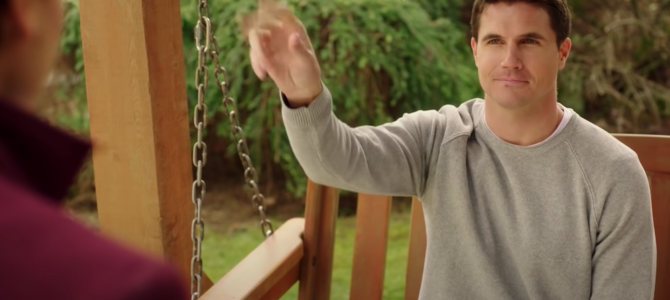
Imagining life after death has a different feeling when God isn’t involved. Without imagining a creator greater than ourselves, our conception of an afterlife’s infinite possibility is substantially lacking. Such is the case with Amazon’s new dystopian series “Upload,” which reimagines life after death as a simulation wherein a person can upload his consciousness for a fee, and live inside this alternate, programmed reality with other consciousnesses doing the same.
Created by Greg Daniels (“The Office,” “The Simpsons”) and starring Robbie Amell, “Upload” tracks the story of a materialistic and digitized afterlife scenario in which you really can take it all with you. You have to, in fact. If you don’t have money to spend for “in-app afterlife purchases” or extra gigs, you could end up with data issues or no skin for your avatar.
The story is told primarily through the experience of Nathan (Amell), who dies young, tragically, and under mysterious circumstances, and is uploaded by his girlfriend Ingrid (Allegra Edwards). He becomes part of her data plan.
Some mild spoilers below.
Class Divisions Persist in the Godless Afterlife
In “Upload,” class divides continue in the afterlife. The uploaded poor have only two gigabytes of data per month, and once they use them, their avatars sit, grayed out, until the next month’s allotment begins. The wealthy have access to vast programs for golfing, dining, horseback riding, and recreation. Their avatars move freely through the intricately programmed Lakeview, the top-of-the-line afterlife program in which “Upload” mostly takes place.
The poor only wish they had it so good as Lakeview. In the two realms, real life and upload life, the poor are in a tough spot. In fact, one of the biggest problems the poor face is that they can’t afford to upload, meaning that before their death, they don’t have the option of burning their bodies with a laser while their consciousness transfers to a hard drive.
Life on Earth is so bad, apparently, that when a freeware, open-source upload program comes along, people without the means to buy their way into Lakeview stand in line for hours to secure their spot in the upload universe. This means, in essence, suicide of the body so the mind can live on in a computer simulation.
The world in Daniels’s “Upload” is so devoid of meaning that the people within it can see no reason not to give up their bodies, real life, sensation, growth, aging, and natural human development. In one brutal moment, a mom is standing in line for this service with her 14-month-old and says that since this is the only chance her daughter will have to upload, they’re taking it. Those few who do prefer the old-fashioned concept of living only as long as their bodies can maintain them are considered oddities, out of touch with reality.
In Lakeview, where Nathan finds himself, there are pop-ups and in-app purchases, all of which cost subscribers dearly. While the feeling of the afterlife, per Lakeview branding, is supposed to feel like paradise, it is the most middle-of-the-road paradise imaginable. It’s a rehash of the same dumb life its inhabitants left. Instead of Siri or Alexa, Lakeview residents call for their “angels,” who are really just minimum-wage employees of a vast tech company keeping the afterlife afloat.
Even Affluent Afterlife Is a Rip-Off
The society imagined in “Upload,” from the real-life component to the afterlife in Lakeview, feels much like Mike Judge’s “Idiocracy.” There are self-driving cars that don’t always obey commands and a dating app called Nightly that is only about one-night stands.
When Nora (Andy Allo), Nathan’s angel, ends up on a date with Byron (Matt Ward), they have sex first, before talking, while wearing body cams. When they do talk, they both worry about revealing too much about themselves, or asking questions that are too intimate — after they’ve been physically intimate. “Upload” culture shies from mental and emotional intimacy, as does our own, and Daniels captures this reality well.
The setting of Lakeview is beautiful. Filmed at the classic Catskills Mohonk Mountain House and the grounds, Lakeview looks like a perfect, preppy wonderland, with Dutch-style architecture and old charms. This rustic yet luxurious mountain house is way better in person, however, than is represented in “Upload.”
In this series, the Lakeview afterlife looks as if a big-box store barfed all over a country club. This couldn’t be further from the feeling at Mohonk, but once it’s overlaid with in-app pop-ups, ads, corporate speak, AI drones, and pixelated mistakes, the whole thing feels cheap, dated, and extraneous.
‘Upload’ Shows the Futility of a Godless Eternity
“Upload” offers a look at life without faith in something greater than ourselves, both in life and afterlife. It reveals a culture so obsessed with living that it takes life itself for granted and presents a collective imagination stunted by instant gratification. Perhaps our culture’s drive to atheism is not so much a push toward revealed reality, but an impulse to squash an imagination that can believe in something greater and more powerful than humanity itself.
If we persist in the belief that human beings and our creations offer everything that makes life worthwhile, we will lose our imaginative impulse and cognitive capacity for boundless possibility. A belief in God offers more than faith in a higher power; it allows us to believe that the confines of human achievement are only a fraction of what exists in the universe.
In its stark portrayal of an atheistic afterlife, “Upload” shows that a belief in God offers a greater understanding of human potential than a life without him.









